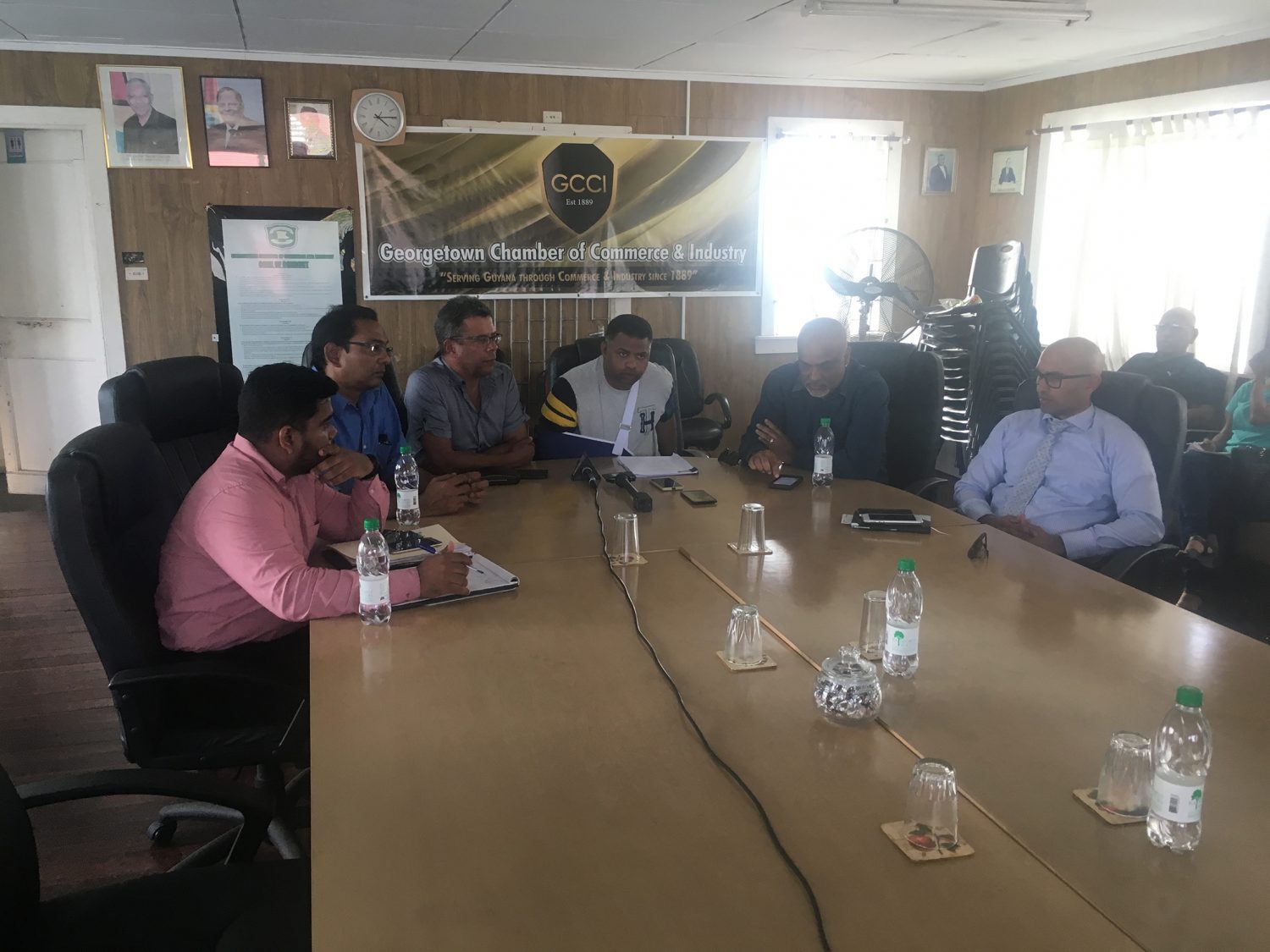The Georgetown Chamber of Commerce and Industry (GGCI) will be undertaking an expert review of the amended parking meter by-laws, which were passed by the city council last week, according to President of the Chamber Deodat Indar, who says any objections would be submitted to the city and Ministry of Communities.
Speaking at a press conference at the GGCI’s headquarters on Waterloo Street, Georgetown yesterday, Indar said that the Chamber wants to ensure it is doing as much as it can to serve its members in light of the furore that arose over the implementation of the paid parking system last year.
“We see it arising again with the new by-laws. The by-laws are somewhere around 76 pages and we have to get our experts to go through them to ensure we find areas that we believe [are] not good for the city,” Indar said, before adding that after the review, the Chamber would submit any objections to the Mayor and City Council (M&CC) and the Ministry of Communities.
Recalling two separate visits to city businesses last year when the parking meter system was implemented, Indar noted that business owners had reported decreases in business ranging from 30% to 70%.
“It was shocking because that kind of numbers in terms of reduction in sales hurt businesses and we, as the Chamber, as a representation body for businesses, are concerned when that happens,” he said.
Indar noted that the GCCI maintains the position that no impact assessment or environmental or feasibility study was done in order to come to the conclusion that there is a need for a parking meter system in the city.
“We want to make sure that we on our side do what we must do from an advocacy standpoint to fix any anomaly that we see within these by-laws,” he noted.
Also present at the press conference were representatives of the Movement Against Parking Meters (MAPM) Marcel Gaskin and Don Singh.
Gaskin emphasised that MAPM still stands resolutely against the current implementation of metered parking in the city since it was forced onto the citizenry. Referencing the “disastrous consequences” that soon erupted after, which included mass protests by citizens and business owners, Gaskin said that the group still remains adamant that the project is being implemented without the required studies being done.
“[It was] implemented without a proper financial study, a proper means assessment – the ability for people to pay for parking. We submit that the tender procedure as outlined in [Municipal and District Councils Act] Chapter 28:01 was breached by the City Council. We are maintaining that the national Procurement Act was breached in soliciting services from Smart City Solutions [SCS]. We maintain that if things are addressed in the correct manner, we would have no objections for meters in the city,” Gaskin said.
Executive member of the GCCI Komal Ramnauth also made brief remarks and explained that the business community in the city is the M&CC’s highest revenue earner and as a result the municipality needs to start listening to it.
“The business community has contributed in container tax fees as of last year and continues to contribute this year. Later this month, the City will meet with the private sector to review those fees. The business people have been making contributions in one form or another,” he said, while adding that the business community is still adamant that if the city wants to increase its revenues, then it should continue to collect the rates and taxes owed.
He said that it should take all the necessary legal measures to ensure that it is able to collect rates and taxes, which the GCCI fully supports.
GCCI Vice-President Nicholas Boyer also noted that the city needs to consult with the organisation so that they can find different ways of alleviating “whatever problems they face that caused them to bring on metered parking.” He said that when the M&CC uses the parking meters as a solution for its problems, it is the businesses that suffered. “If you affect the traffic of the city, then you affect the health of the city,” he said.
When questioned what their next will course of action be if the by-laws are upheld by the Ministry of Communities and the metered parking resumes in the city, Gaskin said that they will continue their protests, since those and legal actions are their two main weapons.
Gaskin, when asked what would be a suitable fee that MAPM would favour for paid parking, emphasised that there is a need for proper studies and assessments to be conducted.
“We need to know how many businesses there are in the affected area and residents. We keep hearing SCS has done a feasibility study but that information is private and can’t be shared and we doubt it has been done so for us to say what is a reasonable fee is impossible,” he added.





